Practicing Public Art
Exploring tools for site-specific dialogues - A Collaboration with FICA
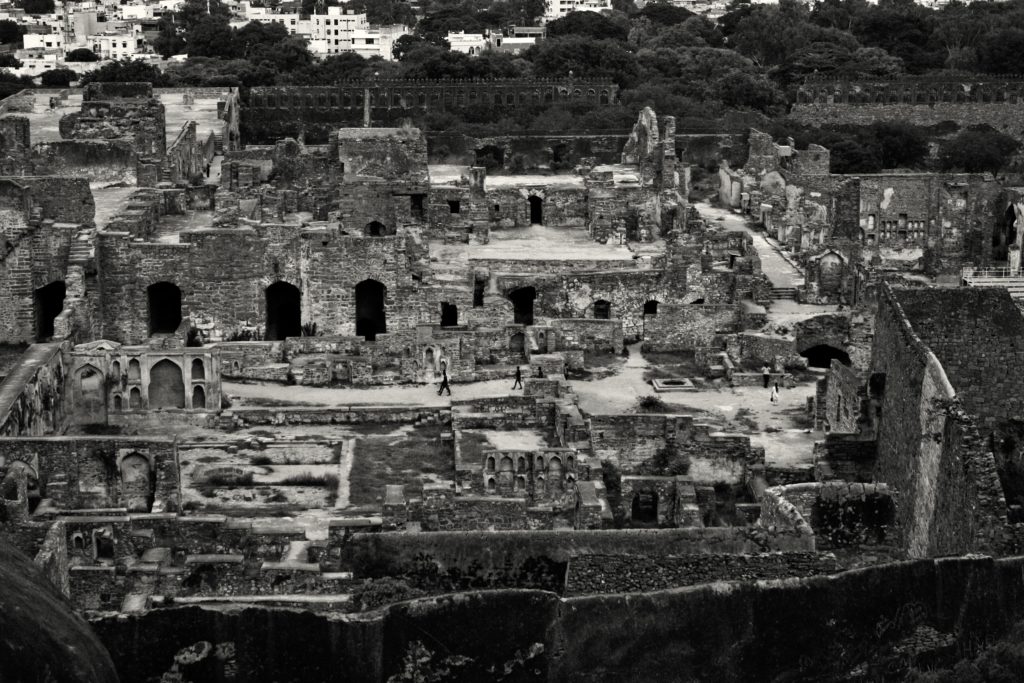
Photo credit: Annalisa Mansukhani, Golconda fort, 2015
Key information
Application Deadline: 19 October 2022
Duration of the workshop: 5 weeks
All sessions for the first four weeks will be held online on Zoom. The last week of sessions will take place on-site in Delhi.
Week 1: 2, 4, 5 November
Week 2: 7, 9, 11 November
Week 3: 14, 16, 18 November
Week 4: 21, 23, 25 November
Week 5: 3 – 10 December (on-site in Delhi)
Days: Monday, Wednesday, Friday. Week 5 will have sessions scheduled daily.
Timing: 3 – 5 PM (For online sessions) Week 5 will have sessions from 10 AM to 6 PM.
Course Facilitator: Sanchayan Ghosh
Fees: INR 1000/-
If the price of this workshop is prohibitive, and the fees prevent you from participating, kindly contact us at [email protected]. We have a limited number of supported places to enable participants to attend this workshop, with a fee waiver.
Please note the workshop will be limited to 10 participants only.
About
A site carries in it elements of continuity and transition, while also accumulating experiences, memories, mundanities and contestations. ‘Site’ is evocative, it is both unwieldy and welcoming, requiring us to further mould its micro-specificities into macro-understandings of public sites and our relationships with/in them. Working with site-specific art brings us closer to studying the inherent nomadic traits of making; such practices develop an agility to engage with the links between interconnected parts in a site, visualising space, building systems and languages of making with.
Led by Sanchayan Ghosh, Practising Public Art: Exploring tools for site-specific dialogues intends to unpack the thematics that accompany our notions of site and situatedness, working towards dispersed and multi-sensory engagements in the field of public art. We hope to open up possibilities of artistic research by expanding on methodologies, processes, mediums and materials, seeking to deconstruct the idea of research itself, looking at public art in both traditional and transformative ways. The workshop will enliven artistic practice and research as an expanded field of study; a reciprocal process of investigation and participation, a collective endeavour of reading the relationships that form between a site and that which occupies it. How do histories of a site communicate with its present interventions? What kind of archives are produced by a public ownership of a site? Where does the performativity of a monument lie? In asking these and several more questions around public art, public spheres and the criticality that underlies public engagement, this workshop will explore what it means to participate in the existing design of a space, converse with the possibilities of a collective and continually reassess the evolving nature of the site-specific across contexts.
The workshop will also include three public lectures by resource persons other than the workshop facilitator. Attendance for the same will be mandatory.
For more information on the modules, click here.
Some of the modules in the course will focus on
- Introduction to public art practices
- Public art beyond monuments
- Public art as a temporary site-specific dialogue
- Public art, museum practices and other institutional dialogues
application requirements
A single PDF (max. 10 MB) with:
a) A brief statement of purpose outlining your interest + a proposed public art project/ themes around public art you would like to work on or are currently working on
b) Your CV
c) A few samples of your work (writings, artworks, projects undertaken etc)
Please ensure external images, texts and video files are included as links within the PDF itself.
Applicants are requested to keep the following in mind
a) The workshop is open to creative practitioners working with public art practices/practitioners with sustained public art projects over the years/those currently interested in developing projects around public art
b) Participants should be willing to work virtually for online sessions and commit to travelling to and spending one week in Delhi as part of the last module of the workshop. No financial support is available for the same.
c) Participants should not have an ongoing educational institution affiliation i.e., should not be enrolled in an educational programme.
d) The course will require intensive engagement with all themes and module exercises. Participants who sign up for it should be ready to commit to the whole programme and be present for every session.
COURSE EDUCATOR
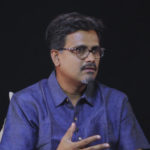
Sanchayan Ghosh received his Masters in Fine Arts from Kala Bhavan, Santiniketan in 1997 and currently works as an Associate Professor, Department of Painting, Kala Bhavan, Visva Bharati University, Santiniketan. Over the years, Sanchayan has been interested in site-specific art and has done extensive work in space designing for experimental and contemporary theatre. With his inspirations from community ritual events and pedagogic practice in Santiniketan and his workshop experience with Third theatre exponent Badal Sarkar he involves pedagogy as practice where he generates collective process of working and learning through workshops process that is interactive and participatory. He re-engages with the notion of study from a multifaceted reciprocal conversation to emerge interdisciplinary crossover of multiple practices and generate critical dialogue around land, landscape transformation, labour and practice.
Sanchayan has offered many workshops to students of different institutions all over India and has most recently been part of the six-member curatorial team of Students’ Biennale 2018 in Kochi, held parallel with Kochi Muziris Biennale 2018. He has also participated and conducted a workshop in the Documenta 14, Gathering Under the Mango Tree – Sites of Learning, 2017.
ABOUT FICA
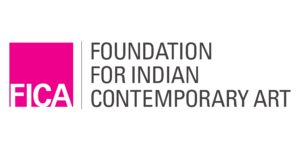
The Foundation for Indian Contemporary Art is a not-for-profit organisation that aims to broaden the audience for contemporary Indian art, enhance opportunities for artists, and establish a continuous dialogue between the arts and the public. We encourage and support innovative practices in the field of visual arts through collaborations, grant-giving and experimental pedagogies. Over the past 15 years, FICA has worked to develop active public programming with the intention of bringing contemporary art closer to its audience. It has remained invested in providing annual grants to various practitioners (whether artists, writers, researchers, public art projects), and creating and establishing sites of learning that take shape as forums, workshops and seminars. We remain compelled to find new ways of sustaining its fundamentals as an organization committed to consistently engaging with different audiences, stakeholders and communities.
Mapping the Shifting Terrains
Reading Public/Reading Art - A Collaboration with FICA
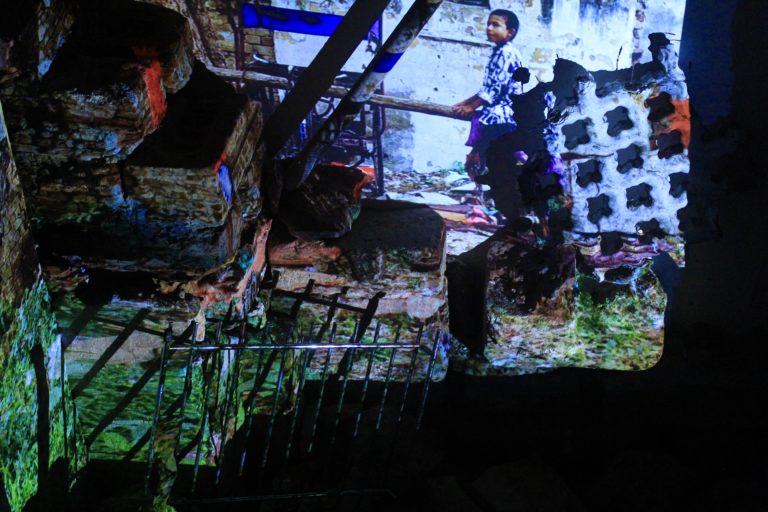
Ankan Datta, details from his installation made as part of ON-SITE: A Workshop exploring process, dialogue
and experimentation, organised by FICA and SAF, 2019
Key information
Application Deadline: 1st September 2022
Dates: September: 17, 24; October: 1, 8, 15, 22 & 29
Timings: Every Saturday, 10 am to 1 pm
Sessions: 1 session per week
These 7 sessions will be led by the facilitator. These sessions will include 3 online sessions led by guest speakers. This course will be held in person at the FICA Reading Room, New Delhi. Three online sessions will be additionally scheduled with guest speaker
Venue: FICA Reading Room, F-213 / E-2, 2nd Floor, Old M B Road, Lado Sarai 110030
Course Facilitator: Santhosh S
Fees: INR 1000/-
If the price of this workshop is prohibitive, and the fees prevent you from participating, kindly contact us at [email protected]. We have a limited number of supported places to enable participants to attend this workshop, with a fee waiver.
Please note the workshop will be limited to 15 participants only.
About
This course, in collaboration with Foundation for Indian Contemporary Art (FICA), attempts to think together and interrogate the complimentary as well as contestatory relationship of the notion of the public, and the nomenclature of public art. Structured as a reading group, it will explore the multiple dimensions of public art practices, their audiences and constituent, emerging vocabularies. The role of art in the public realm in the 21st Century is one with a multidisciplinary emphasis, and this workshop seeks to map out the present socio-cultural/ political moment for public art through modes of reading and writing that will critically consider what public art is un/able to respond to today.
When we outline the breadth of the definitions and details of public art, the terms that arise in association include notions of community, site, intervention, collaboration, appropriation, citation, infrastructure, reception, conversation, curating, participation, negotiation, interface, spectacle and performance, among several others. Through the framework of this workshop, we hope to accomplish a critical positioning and dissecting of intersections between some of these terms and concepts: public art, public space and public sphere (within it the larger context of urbanity, visuality and their expanses and limits). This includes the discussions regarding the formation and affectivity of different publics/audiences; and also possibly, the relationship between public art and the environment, a theme that is an ongoing engagement for FICA via different platforms.
What do artistic practices, working with aspects of the rapidly transforming public realm today, offer to the people and communities they serve? What are the forms of engagements that public art assumes as it unfolds within and across different spaces? What are the kinds of social relations and experiences elicited and invited through such interventions? Platforming these enquiries, we would like to read and highlight the methodologies that drive art practices in the public realm, reflecting upon how the field may be discussed, and how different perspectives and approaches in public art practices reframe and subvert meanings of site and situation. The sessions will also be a process to think about how reading and writing as practices can be positioned within such circuits, particularly focusing on the kinds of questions that can be asked of public art/art and its publics.
Some of the modules in the course will focus on
1. Art, Public and the Counterpublic
2. Mapping the Terrain
3. The Commons
4. Rethinking Public/Art
5. Placing Public/Art
requirements
The course is open for those with a deep interest in the subject of Public Art and are working, or researching on it or on other allied areas. The course will require some amount of reading ahead of each session. Participants who sign up for it should be ready to commit to the whole programme and be present for every session. The sessions will take place in English.
The workshop will take place at the FICA Reading Room, Delhi and participants are required to be present in person for it. There are no provisions to support travel and stay costs for out station participants. So please apply keeping this in mind.
Applicants are requested to keep the following in mind
1. We have a limited number of seats for the course, numbering 15.
2. We will confirm your participation by September 2, 2022.
3. The medium of instruction for this course is English.
4. All readings will be provided to the selected participants ahead of time so that they may familiarise themselves with the required texts.
COURSE EDUCATOR

Dr. Santhosh Sadanandan is an art historian and cultural theorist based in New Delhi. He is trained in Art History and Criticism with BFA and MFA degrees from the Faculty of Fine Arts, Maharaja Sayajirao University of Baroda. He received his PhD in Visual Art from the School of Culture and Creative Expressions (SCCE), Ambedkar University Delhi. His doctoral thesis was titled ‘Spectres of Caste: Institutionalisation of Art in Modern India.’ It examined various aspects of the institutionalisation of culture and the role that categories such as caste played in the structuration of artistic production in modern India.
One of the founding members of SCCE, he has been a part of the team that developed a vision document for the school. Before SCCE, Dr. Sadanandan taught Art History for two years from 2005-2007 at the Department of Art History and Aesthetics, Faculty of Fine Arts, M.S. University of Baroda. He was also a guest faculty at the School of Art and Aesthetics, Jawaharlal Nehru University, New Delhi from 2009 to 2011. He worked as an Academic Fellow for SCCE, AUD from 2011-2012, before joining as an Assistant Professor in the same School. His areas of interest are Critical Theory and Philosophy.
ABOUT FICA

The Foundation for Indian Contemporary Art is a not-for-profit organisation that aims to broaden the audience for contemporary Indian art, enhance opportunities for artists, and establish a continuous dialogue between the arts and the public. We encourage and support innovative practices in the field of visual arts through collaborations, grant-giving and experimental pedagogies. Over the past 15 years, FICA has worked to develop active public programming with the intention of bringing contemporary art closer to its audience. It has remained invested in providing annual grants to various practitioners (whether artists, writers, researchers, public art projects), and creating and establishing sites of learning that take shape as forums, workshops and seminars. We remain compelled to find new ways of sustaining its fundamentals as an organization committed to consistently engaging with different audiences, stakeholders and communities.
B-Side | DJ Mixing Workshop
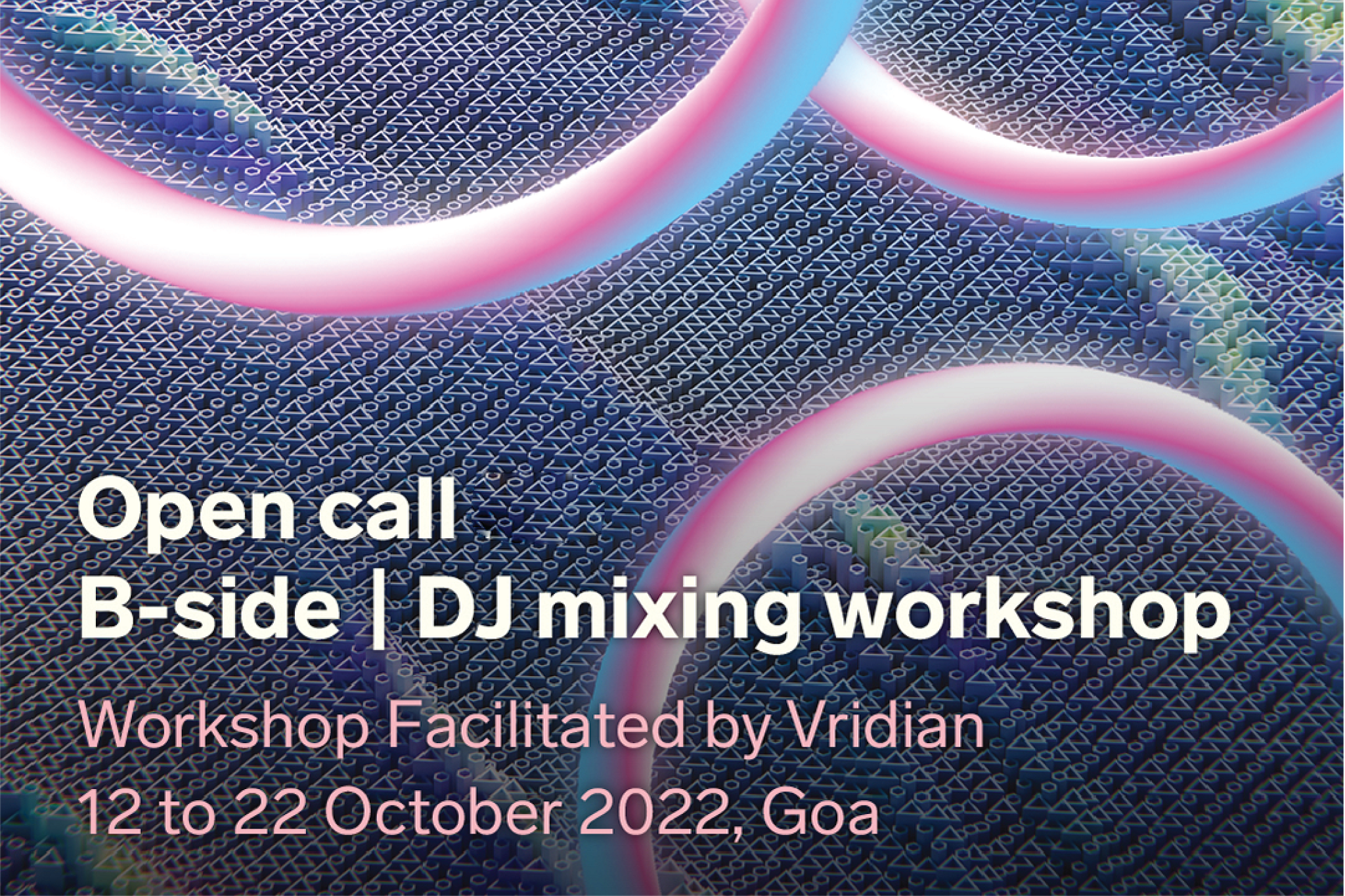
Key information
Dates: 12th to 22nd October 2022
Venue: Satori Wellness, Arambol, Goa
Workshop Facilitated by : Vridian
About
B-side is an initiative by Serendipity Arts centred around independent music and cultural currents stemming from contemporary music practices. The programme strives to spark conversations around music production, DJ-ing, research, performances, educational modules, and collaborative sonic explorations focused on emerging acts around South Asia.
The role of the DJ in modern society has evolved, much like the craft associated with it. From the humble position of the disc jockey at the radio station in the ‘70s, to the almost cult status we see today; from playing limited edition pressed vinyl in warehouses in the ‘80s to the sophisticated technology we have available now, there has been a huge shift in the way we perceive and experience music mixed and played by DJs.
In India, it has become a more than respectable profession as opposed to the “DJ for Hire” tag that earlier surrounded it. Of course, it’s taken quite a lot to get to this point – and as a part of B-side, we get to relive it all.
This workshop lays heavy emphasis on practical know-how, because of which participants will learn to navigate their way around mixing on turntables, CD players (and USB), and even laptops, with access to club/event ready gear. A DJ also has to do plenty of homework related to music research, finding songs, practice and file management– all of this will be touched upon in detail. The workshop will include guest lectures from relevant figures in the industry who will share their insights from years of expertise in the domains of performance, venue programming, and artist management.
Join us as we traverse different workflows, gear, and techniques while also taking a deep dive into electronic music culture and its history. Regardless of proficiency in music theory and technology, this course is open to everyone.
WORKSHOP FACILITATOR

VRIDIAN is an electronic music project based out of New Delhi, India. Being the alias of music producer Vir RC, this project has a penchant for atmospheric, emotive and groovy electronic music. Inspired by a wide range of musical influences, VRIDIAN has released on imprints such as Manjumasi,Traum Schallplatten, Qilla Records, Nie Wieder Schlafen & Dream Culture. With a passion for the craft of (appropriate & situational) DJing, the project has also become a regular feature on club bills across the Indian sub-continent. VRIDIAN’s releases have gained active support from the likes of Atish, Frankey & Sandrino, David Hohme, Kohra, Tim Penner & Mark Slee. His catalogue also boasts stellar remixes of his music from some of the best in the game, such as Clarian & Tim Engelhardt.
SELECTED PARTICIPENTS
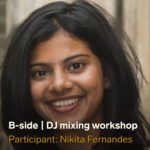
Nikita Fernandes works between museum and arts education, zine-making, and music writing. Her interests lie in the web of interconnected references and influences in the arts – music, cinema, and literature. She completed her BA in Sociology and Anthropology from St. Xavier’s College and a Postgraduate Diploma in Critical Theory, Aesthetics and Practice from Jnanapravaha.
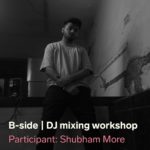
Shubham More is a Mumbai-based producer whose signature style has roots in the deep and hypnotic sounds that are a staple of underground music around the world. Although he has found his footing in these undulating and modulated soundscapes, lately he has been delving into the more experimental sides of Electronic Music in an effort to carve out his own niche of dance music whilst staying true to his rave roots.
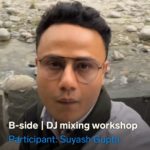
Born in Agra, Suyash Gupta DJs under his moniker ‘Suture’. Professionally a travel and tech entrepreneur, Suyash is the Director at Travel Bureau and Founder of Transportal. As a budding DJ, he often plays at rooftop cafes and clubs in his hometown. His sound is evolving and absorbing heavy influences from techno, drum n bass, breakbeat, and disco. Through the workshop, he wants to hone his skills further and seed an alternative & underground music and nightlife culture in the city of Agra.
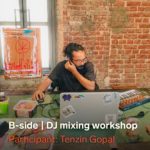
Tenzin Gopal is from McLeodganj, a small multi-cultural town in Himachal Pradesh. Currently based in Vadodara where he had done his Visual Arts practice in Sculpture, he is a freelance artist who travels whenever possible.

Vinita Divgi is a seeker of art, in its multidisciplinary forms and across mediums. She earned a Masters in English Literature with a thesis on the evocation of smell in literature. Extending upon her thesis, she is currently researching the role of sensory experience within artistic spaces.
WOULD I LIE TO YOU?
On the Use of Documents in Theatre

RED by Living Dance Studio, Picture Credit - Richie Wong
Key information
Dates: September 1st to October 22nd, 2022
Sessions: 3 sessions per week | 4 hours per session | 21 sessions total
Twice a week with facilitators and once a week collaborative/group work at a mutually decided time.
Mode: Online
Course Leaders: Kai Tuchmann and Anuja Ghosalkar
Fees: INR 6000/-
If the price of this workshop is prohibitive, and the fees prevent you from participating, kindly contact us at [email protected]. We have a limited number of supported places to enable participants to attend this workshop, with a fee waiver.
About
“Today here and now the document belongs to the power of the State and to very specific figures representing the State. It carries the stamps of well-known faces, figures and names. There are new actors, new heroes, and new men of the state. To that extent, we need to tear the document away from some people—without tearing it. Our job then today is to make documents illegal, not as documents of the state, but documents of existence.”
[Excerpts from Soumyabrata Choudhury’s closing lecture for Connecting Realities— a symposium curated by Ghosalkar and Tuchmann.]
The entry point for documentary theatre practice is, as the name suggests, a document. The nature of this document is varied, complex, amorphous, and shapeshifting. As an entry point — a memory, a metaphor, a gesture, an image, a site, an artwork can all be considered documents. The nomenclature of the “documentary” is overloaded with truth claims, that are constituted through the permeable border of reality and fiction.
In the symposium, titled CONNECTING REALITIES curated by the facilitators of this course, theatre scholar Rustom Bharucha stated that approaching documentary theatre through aesthetic-formal definitions will always fall short, if one does not consider the different institutionalized frameworks of cultural funding. In the spirit of this reflection, our course will set out to nurture organizational architectures that fuel this form, for which a blueprint may not exist.
We will do so in a time when almost any pursuit of truth, intermingles with (social) media`s performativity—destabilizing the logical contradictions of truth-lies, fact-fiction, and real-fake. In our times of ubiquitous computing, real events instantly transform into media and data, housed on servers. Eventually, almost all human expression becomes storage, and an object of computable manipulation—beyond the control and knowledge of the entity, classical philosophy referred to as, “the subject”. What does it mean then, to tell stories under this condition of a shifting idea of subjectivity?
Our course will equip theatre-makers and artists with techniques and aesthetics to deal with an updated notion of the document in our digitized age. The methodological starting point for the course is rooted in practical experiments, while theoretical frameworks and texts will have an interpretive function, to enable and inform understanding. In addition, there will be curated conversations between invited international artists that the participants are mandated to attend.
Terms and Conditions
- We have a limited number of seats, 12 only
- We will inform you of your participation by August 1st
- The medium of instruction of this course is English
- A docket will be made available to the selected participants before the course begins. It will provide access to the program schedule, list of speakers and sessions, readings, bibliography, and links to digital archive
Disclaimer
We invite applications from theatre makers, performers, visual artists, filmmakers, writers, artists working at the intersection of these practices, or those whose artistic practice defies easy definition. The program is NOT limited to practitioners from the arts but is open to journalists, scientists, coders, lawyers, academics archivists, researchers, people with a broad interest in documentary perspectives in theatre making.
COURSE LEADERS
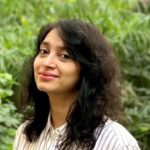
Anuja Ghosalkar is the founder of Drama Queen—a Documentary theatre company, evolving a unique form of theatre in India since 2015. Her practice focuses on personal histories, archival absences and blurring the hierarchies between audience and performer—to extend the idea of theatre to create audacious work. Iterations around form and process, modes of (social) media, sites, technologies, and reclaiming narratives on gender and intimacy are critical to her performance making and pedagogy.
Her performances and workshops have been programmed by University of Oxford, Jawaharlal Nehru University, Sophiensale, Serendipity Arts Festival, National Centre for Biological Sciences, and Forum Transregionale–ZMO, among others.
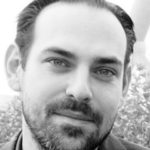
Kai Tuchmann works as a dramaturge, director and academic. As a guest professor at the Central Academy of Drama in Beijing, he helped develop the curriculum for the BA Dramaturgy program there. Kai has also researched the history of dramaturgy as a Fulbright Scholar at the Graduate Center of the City University New York, and he is a Fellow of the Mellon School of Theater at Harvard University. In his internationally shown documentary theater works, Kai has explored the afterlife of the Cultural Revolution in contemporary China, the impact of urbanization on migrant workers in Europe and Asia, and the role of the body in the face of digital technologies.
GUEST SPEAKERS
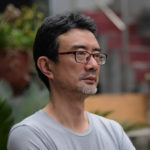
Zhao Chuan, born in 1967, works across theatre, literature, film and contemporary art. He creates alternative and socially engaged theatre and is the founding member and mastermind of the Shanghai-based theatre collective Grass Stage (since 2005). For over a decade, as a theatre maker and writer, he has created a number of theatre works across China together with his collective Grass Stage.
In his session Zhao Chuan introduces his theatre practice with this collective Grass Stage. Their theatre begins with people coming together. Its production mode can also return to the gathering of people – workshop is the starting point of their work. Theatre is the response and transcendent imagination of different people of the age, life and emotion. Thus, we are constantly forging “collective” methods and aesthetics to explore how to present the narrative of different people, to activate “our” presence, and to show profound understanding of the world by people.
The Time Is Now- A Course on Live Art

Key information
Dates: May 31 – July 08, 2022 (Tuesday and Friday)
Venue: Online (3hrs. on course days)
Application deadline: Applications closed
30 seats/ Selection process is based on application and interview
Course Leader: Amitesh Grover
Fees: INR 6000
There is a fee waiver for limited seats. Please email [email protected] for further assistance.
About
“Performance art was the one place where there were so few definitions”
– Laurie Carlos
In the post-pandemic world, there is a need to rethink and bring close all that which has been ‘distant’ from us. The universal suspicion of breath and the body, induced by the plague-stricken times, urges us to return to the body as the primary vehicle of meaning and expression. This course explores forms of Body art, Performance art, and Live art that activate a body or bodies temporally for an audience present at the time. It will highlight artistic practices in body art, performance art, or live art that focus on the need for immediacy and interactivity. It will make space for experimental processes, for bodies and identities that might otherwise be excluded from traditional contexts. From intimate encounters to civic spectacles, from attendance at shows and installations to mass participation in virtual events, this course will look closely at practices that are concerned with all kinds of art that unfold in front of an audience. Rather than a description of an art-form or discipline, this course will posit ways of thinking about what Live Art is, what it can do, and where and how it can be experienced.
“If you want to know what the mainstream will be up to in ten years’ time, just look at what Live Art is doing now.”- The Guardian
The course will highlight a range of practitioners, from those working at the edges of theatre, dance, film and video, to performance writing, socio-political activism and the new languages of the digital age. It will cover the work of artists whose performances do not comply with the strictures of traditional designations, but instead shock us, destroy pretence, create sensory immersion, break apart traditions of representation, and open different kinds of engagement or interaction. In the end, it will discuss how Live Art resists co-option, how it stays radical, and how a new world is made where life and art are inseparable and shape one another.
“Live Art is an orchid in the land of technology”
The course is designed and led by the award-winning interdisciplinary artist Amitesh Grover. His work moves beyond theatre into visual art, film, installation, digital art, and text-based art. His practice strongly focuses on creating art that is interactive and participatory in nature. To build this 6-weeks long course, he has invited the practices and voices of other artists, thinkers, and writers who reveal the contemporary contours of Live Art and share their knowledge and experience. Participants will be introduced to the aesthetics and politics of Live Art in a dynamic, interdisciplinary, ideas-driven journey. This course is meant not only for young researchers, writers, curators, and practitioners but also for viewers and art enthusiasts with a keen interest in the field. The course will include lectures, talks, presentations, and the showing of archival material. Attendees are expected to be present online for all sessions, to participate in discussions, and to complete weekly assignments. On the successful completion of the course, a certificate will be awarded.
Why would you make live work in an age of mass communications? Why work in more or less the only field which still insists on presence? For artists interested in “the contemporary” this area of live performance seems like a bit of a backwater. Do you have something against mass-reproduction? Do you work from some quaint notion about immediacy and real presence?
I don’t know. Answer the question.
(Forced Entertainment 1996:87)
COURSE LEADER
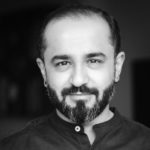
Amitesh Grover is an award-winning interdisciplinary artist, whose work moves beyond theatre into visual art, film, installation, digital and text-based art. His practice strongly focuses on creating art that is interactive and participatory in nature.
LOGIN to see more
To see all the content we have to offer, login below
OR
Don't have an account?
REGISTER FOR FREE
REGISTER FOR FREE
Registration is completely free, stay connected to Serendipity Arts

